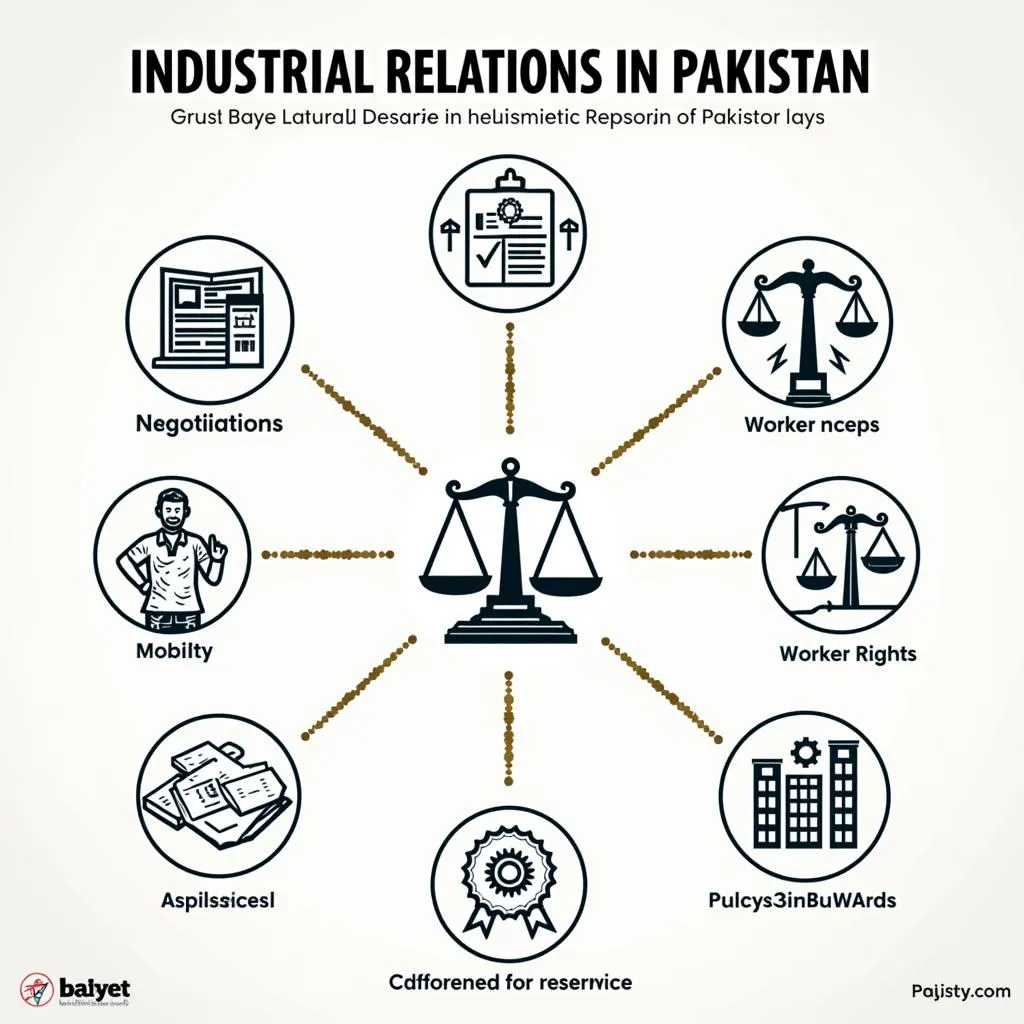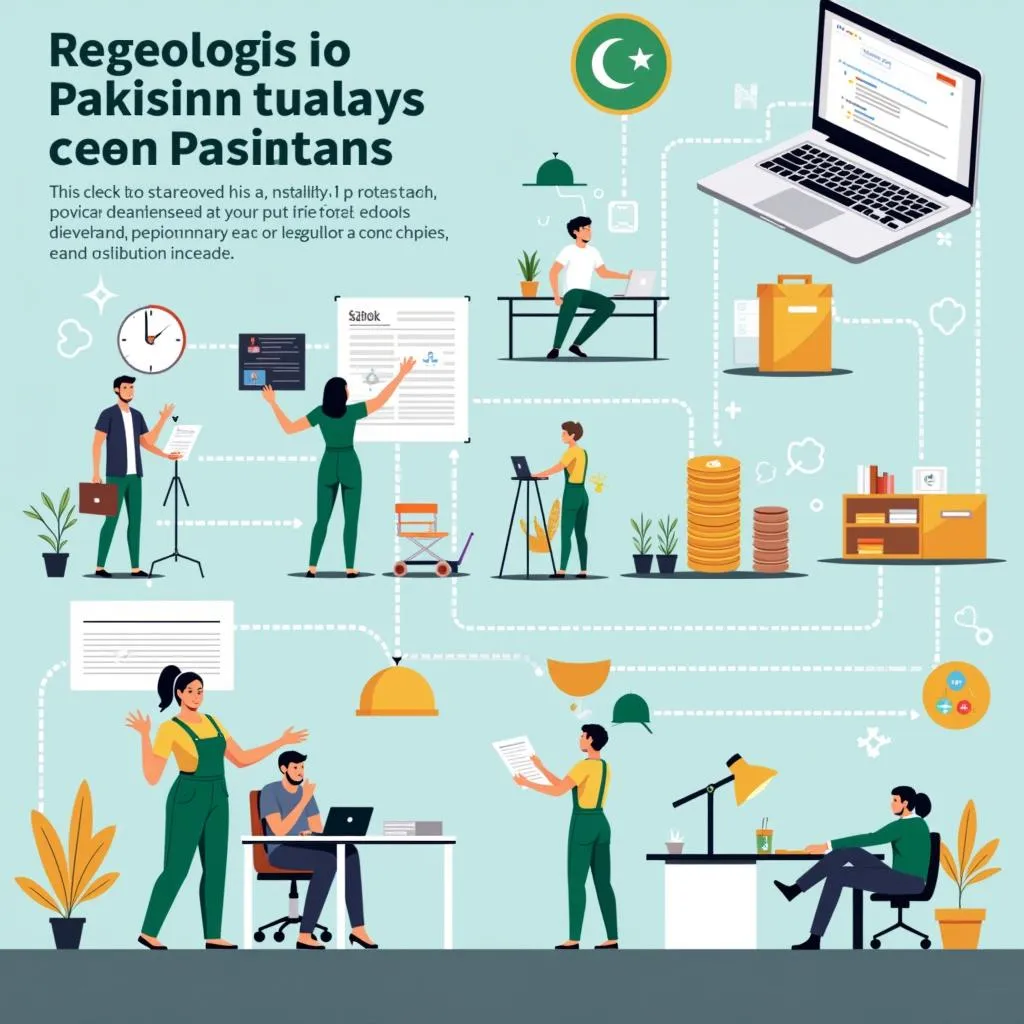Industrial Relations (IR) in Pakistan is undergoing a period of dynamic transformation. As the nation navigates the complexities of globalization, technological advancements, and evolving labor market dynamics, the scope of IR is expanding beyond its traditional boundaries. This article delves into the evolving landscape of IR in Pakistan, exploring its growing significance and the opportunities it presents for a harmonious and productive work environment.
 Industrial Relations Landscape in Pakistan
Industrial Relations Landscape in Pakistan
Understanding the Evolving Landscape of IR in Pakistan
Traditionally, IR in Pakistan has centered around dispute resolution, collective bargaining, and the enforcement of labor laws. However, the scope of IR is broadening to encompass a wider range of issues, including:
- Human Resource Management (HRM): With increasing emphasis on talent acquisition and retention, IR professionals are playing a crucial role in shaping HR policies and practices that foster a positive work environment.
- Workplace Diversity and Inclusion: Pakistan’s workforce is becoming increasingly diverse. IR practitioners are instrumental in promoting inclusive workplaces that value diversity and ensure equal opportunities for all.
- Occupational Health and Safety: Ensuring a safe and healthy work environment is paramount. IR professionals contribute to developing and implementing safety protocols, promoting awareness, and advocating for workers’ well-being.
 Digital Transformation and Labor Laws in Pakistan
Digital Transformation and Labor Laws in Pakistan
The Impact of Globalization and Technology on IR in Pakistan
Globalization and rapid technological advancements are reshaping industries and the nature of work itself. This transformation presents both challenges and opportunities for IR in Pakistan:
- The Rise of the Gig Economy: The gig economy, characterized by short-term contracts and freelance work, is gaining traction in Pakistan. This new model of employment necessitates innovative approaches to IR, addressing issues like worker classification, social security, and fair compensation.
- Automation and its Implications: As automation transforms industries, there are concerns about potential job displacement. IR professionals will play a vital role in facilitating reskilling and upskilling initiatives to equip the workforce with the skills needed for the jobs of the future.
- Digitalization of IR Processes: Technology is streamlining IR processes, with online platforms for grievance redressal, collective bargaining, and dispute resolution. Embracing these digital tools can enhance efficiency and transparency within IR systems.
Key Challenges and Opportunities for IR in Pakistan
While the evolving landscape of IR in Pakistan presents numerous opportunities, several challenges need to be addressed:
- Strengthening Labor Laws and Enforcement: Ensuring that labor laws are updated to reflect the changing nature of work and that they are effectively enforced is crucial for protecting workers’ rights and fostering a fair and equitable workplace.
- Promoting Social Dialogue: Open and constructive dialogue between employers, employees, and the government is essential for addressing labor market challenges and fostering harmonious industrial relations.
- Enhancing the Capacity of IR Institutions: Strengthening the capacity of labor courts, mediation bodies, and other IR institutions is essential to ensure their effectiveness in resolving disputes and promoting social justice.
FAQs: Addressing Common Queries about IR in Pakistan
1. What is the role of trade unions in Pakistan’s IR system?
Trade unions play a vital role in representing workers’ interests, engaging in collective bargaining, and advocating for fair labor practices.
2. What are the key labor laws in Pakistan?
The Industrial Relations Act 2012, the Payment of Wages Act 1936, and the Factories Act 1934 are some of the key labor laws governing employment relationships in Pakistan.
3. How can I file a labor complaint in Pakistan?
Workers can file complaints with the Labour Department or approach labor courts to seek redressal for violations of their labor rights.
Exploring Further: Navigating the Future of Work
To learn more about the dynamic field of IR and explore related topics, consider these insightful articles:
- Bulldozer Price in Pakistan: Explore the construction industry, a sector heavily impacted by evolving labor dynamics and technological advancements.
- Nursing Scope in Pakistan: Discover the healthcare sector and the crucial role of IR in ensuring fair working conditions and quality patient care.
- Certeza Digital BP Apparatus Price in Pakistan: Delve into the world of healthcare technology and its intersection with labor regulations and workplace practices.
As Pakistan progresses, the scope of IR will continue to evolve. Embracing a forward-looking approach, fostering dialogue, and adapting to the changing dynamics of work will be essential in creating a harmonious and productive work environment that benefits both employers and employees.
Need Assistance? We’re Here to Help!
For any inquiries or assistance regarding labor laws, industrial relations, or related matters, please don’t hesitate to reach out to us:
Phone: +923337849799
Email: [email protected]
Address: Dera Ghazi Khan Rd, Rakhni, Barkhan, Balochistan, Pakistan.
Our dedicated team is available 24/7 to provide guidance and support.